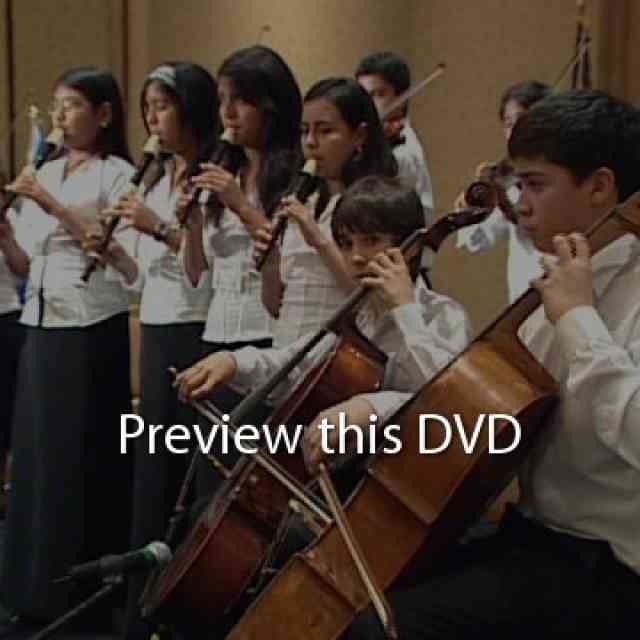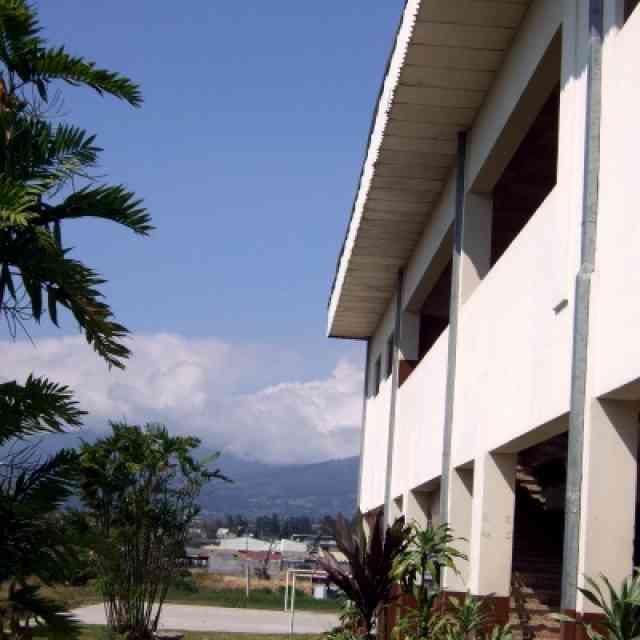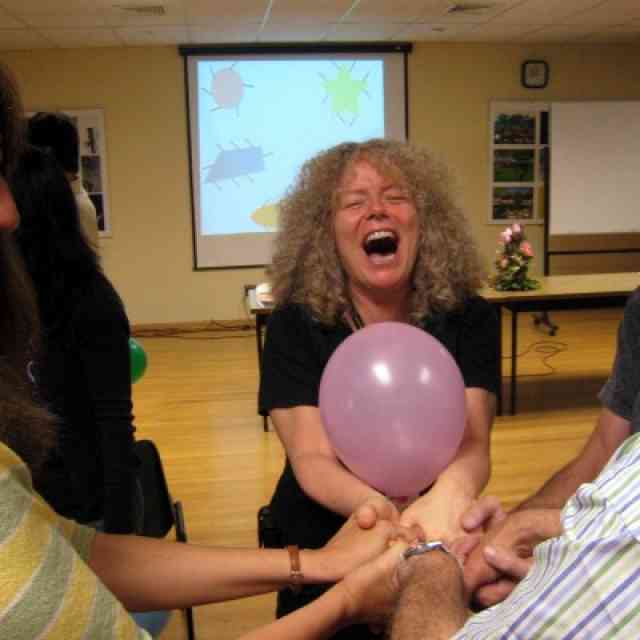This year Lima hosted the Third Latin American Suzuki Teachers Conference, directed by Roberta Centurion and Caroline Fraser. The growth and development of these Encuentros has also been phenomenal. The first Encuentro was held in 1999 and the second in 2002. This time we felt the need to change hotels at the last minute because more and more people wanted to come, and we were still crowded in the bigger meeting rooms! There were 15 countries represented, several for the very first time and over 100 people in attendance. A few of these countries have had Suzuki programs for more than 20 years, such as Argentina, Brazil, Puerto Rico and Peru; some for almost that many years such as Bolivia, Colombia, El Salvador, Costa Rica, Mexico and Chile; but there were also countries represented which had newer or smaller programs such as Ecuador, Uruguay, Paraguay, Panama and Venezuela.
The Encuentro was a three-day event with several excellent talks and panel discussions. Past SAA presidents, Tanya Carey, Pat D Ercole and William and Doris Preucil spoke about their “Vision for the Future”; Doris Koppleman spoke about “The Challenge of Change”; Pam Brasch and Dee Martz gave presentations on the Suzuki Association of the Americas and on “Servant Leadership.” Other presentations were given by Caroline Fraser, David Gerry, Blancamaria Montecinos, Fernando Piñero, Gabriel Pliego and Dave Madsen. A panel discussion on “How to Organize a Festival” was led by Andrea Espinzo (Argentina), Dilva Sanchez (Colombia), Etna Diemecke (Mexico) and Annika Petrozzi (Peru). Flor Canelo (Peru) and Valene Goldenberg (Chile) gave a joint presentation on Latin American Music.
In addition, we heard reports from all 15 countries. These were wonderful and very informative, most with PowerPoint presentations and/or videos. We hope to have them soon on the Latin American Suzuki web site: www.latinsuzuki.org. Every day after lunch, the 15 country representatives met to discuss and make decisions about concerns and issues affecting all of the Latin American Suzuki programs. The third day was full to the brim with workshops on “Strategies for the Future,” involving wonderful participation and demonstrating cooperation from all participants. Throughout the Encuentro I was very impressed with the Suzuki spirit in action. Here were people from 17 countries (including the U. S. and Canada) working together, non-competitively and unselfishly toward the common goal of bringing music and growth to the children of the world. At one point, when we were working in four breakout different groups on goals and strategies, one goal that appeared on the white board from each group was to “bring the Suzuki Method to the poorest parts of our countries so all children can benefit.”
Afterwards, Doris Koppelman remarked, “Such warmth, caring and generosity of spirit is so welcome—such a wonderful example. It is unfortunately so rare in these days of mean-spirited selfishness in which every day brings news of more cuts in aid to the poorest families and children in our wealthy country”.
We ended up in a flurry of note taking and decision-making and setting the date for our next Encuentro for 2007. Country delegations came forward to receive their certificates, and in some cases an instrument donation from the SAA or materials from Warner Bros. We finished late, as we celebrated with our great colleagues and toasted the future of the Suzuki Method in Latin America with the famous Peruvian Pisco Sour!
We would like to thank the SAA for its support for this event: Pam Brasch and Dee Martz’s presence and participation in the conference, updated Latin American directories, new translation packets, instruments, music, and the offer of a year’s subscription of the SAA Journal for all participants. In addition, several participants had been awarded SAA scholarships to attend the XX International Suzuki Festival, which was held in conjunction with this event.
From Panamá
For the first time Panamá was represented. Margarita Troetsch writes:
This was a personal positive experience necessary to grow professionally and as a human being. Being able to meet so many people of so many places, so different but so similar, so far apart but so close … being able to share with them our interest in learning, in teaching, in observing and discovering, interest in improving, as Dr. Suzuki taught us, is an invaluable opportunity. Because I have attended many teacher conferences, workshops and institutes in the US and Canada in the past, I could appreciate and differentiate between them. I concluded that the most important difference was that in Lima, I was able to share with people who live daily lives so similar to mine, who speak my language and with whom I share bonds and historic events that identify and characterize us. However, the bottom line was that we were all trying to start a Suzuki program in our own countries because we believe in it and the only way to achieve this is to work together. This is what the Suzuki Association of Peru is accomplishing: to make the bond that unites us stronger so we learn from each other and become the leaders we need to be.
The Teacher Trainers who participate in this Encuentro, all exceptional performers and SAA leaders, offered their expertise through conferences to motivate us to continue to spread the Suzuki Method. We were constantly moved to continue in a most effective way. We concluded that our programs should be based on the Suzuki Philosophy and on the continuous training of teachers. We had a chance to learn about the different Festivals that take place in Latin America. Finally, we had time to talk about our dreams, our ideals, and our difficulties and to present possible solutions. Three days became a very short time for all that needed to be done. The enthusiasm of the participants led us to unplanned meetings at lunchtime and longer sessions every day. We left the Encuentro motivated to continue with tools and specific action plans. We were able to form a Committee with a representative of each of the 15 participating countries. As I said in the Encuentro, I am very grateful to Caroline Fraser for inviting me so many times (since 1998 when I met her) and considering me for such an important event in the Suzuki World.
From Costa Rica:
Costa Rica also participated for the first time. Lidia Blanco wrote:
Our lives as Suzuki Teachers were touched by every conference and country report, each one lending a new idea or insight, contributing to the expansion of Dr. Suzuki’s philosophy. As a result of this 3rd Suzuki Teacher’s Conference, Costa Rica will soon have its own Association: one which, like the Associations of Argentina, Colombia, El Salvador, and Peru, will work towards bringing Teacher Training to music teachers and institutions in our own country and neighboring countries as well. I am sure that every Conference participant has taken advantage of the opportunity to be nurtured both musically and pedagogically, and to learn from this model of an Association so that we can all imitate the perseverance, organization, and most especially the commitment to give and serve others.
Thanks for Support
The Suzuki Association of Peru has received numerous messages of thanks from scholarship recipients. Fernando Piñero, Argentina, wrote the following:
I would like to thank all who made this encounter possible. In addition to those responsible within the Suzuki Association of Peru, I thank those who unselfishly collaborated from afar, perhaps not knowing exactly where the funds were going, but understanding that a good deed, wherever and in whatever way it is performed, sooner or later has a positive consequence somewhere in the world even although they may never see it.
We would like to thank everyone who contributed to the Latin American Scholarship Fund; the SAA, the Cleveland Institute of Music, Rebecca Boblak and the Berkeley Music Cooperative and individual teachers and friends from all over the United States, Canada and Spain. Dr. Suzuki said, “All children can.” Thank you for helping touch the lives of children and their families in Latin America.









